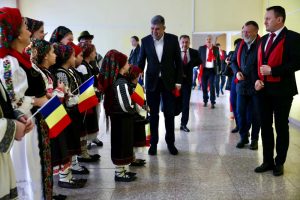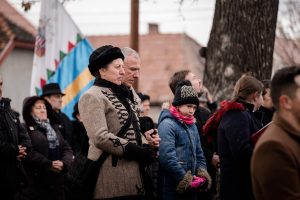The ultra-nationalist parties could receive a quarter of the votes if the EP elections were held now.Continue reading
Szeklerland will never be granted autonomy, said Romanian Prime Minister Marcel Ciolacu, leader of the Social Democratic Party (PSD), at the end of his two-day visit to Szeklerland on Saturday at the election meeting of his party’s county organization in Covasna (Kovászna).
Romania’s rotating prime minister owes his political career neither to above-average achievements in any field nor to special merits as a party soldier. The fact that the colorless graduate of a controversial university (currently ranked 61st in Romania) has nevertheless come so far is due to a combination of circumstances that made him appear to be a stopgap at the right place at the right time. Now he wants to jump over his shadow and make a name for himself with pithy slogans, as he did at the end of last week in the majority Hungarian-speaking Szeklerland.

Children form a line for a politician, an image reminiscent of times gone by. Photo: Facebook/Marcel Ciolacu
Recently, Loránt Vincze, a member of the Hungarian minority, ensured that his colleagues in the European Parliament had a connecting point with Marcel Ciolacu: He confronted the Romanian President Iohannis, who was present, with his ironic greeting “Jó napot, Ciolacu!” (Good day, Ciolacu!) from 2020, when he misused the Hungarian language as a political tool against his political opponents from the Social Democratic Party. At the time, the head of state accused the PSD leader of treason: he accused Ciolacu of having left Transylvania “to the Hungarians” by tacitly adopting an autonomy statute for Szeklerland in the lower house.
After four years, the old squabbles with Iohannis’ National Liberals are a thing of the past. The two parties of the governing coalition that got rid of the Hungarian party RMDSZ, are running under one flag in the European elections. However, the infamous “Hungarian card,” regularly played to keep Romanian voters happy in the absence of convincing results, has not been forgotten.
Szeklerland will never, ever be autonomous! I will explain why. Firstly, because we, the Romanians, did not give them autonomy. What is more, we Romanians did not take it away from them,”
stated the PSD leader, who went into election campaign mode. In an honest effort to cheer on the sparse PSD voters in southern Szeklerland, the law graduate ventured into foreign climes and offered the Romanian audience a crash course in Transylvanian history, which bore striking similarities to a propagandist historical drama (Michael the Brave by Sergiu Nicolaescu, 1970), which Marcel Ciolacu must have seen as a schoolboy: “In our history, we have never fought with the Szeklers and the Szeklers have never fought with the Romanians. If they were treated unfairly, it was by the Saxons and the Hungarians. I know that we fought together under the flag of Michael the Brave.” The fact that modern autonomy, which is a reality in many EU countries, is different from the medieval and early modern statute of autonomy in Transylvania, eluded the prime minister, as did the difference between the concept of the statute and the modern concept of the nation.

Madéfalva, 2023. Photo: Facebook/Külhoni Magyarok
Shrewdness is a virtue that cannot be denied to Romanian politicians. It also seems to be the preferred means of propelling Ciolacu to the top of Romania’s strongest party. In Szeklerland, the Bucharest head of government managed to kill two birds with one stone: On the one hand, he declared (“urbi”) his rejection of the “autonomy nonsense,” (which he had already reaffirmed at the end of the year) to the growing crowd of nationalist-minded voters. On the other (“orbi”), he appeased the European Union, which is averse to any ethnically-motivated anger on its eastern flank, by extolling the virtues of EU, NATO, the envisaged OECD, and the hoped-for Schengen membership in the best Brussels “newspeak.” He also assured his audience in Târgu Mureș (Marosvásárhely), in a town where the first victims of ethnic hatred in Europe after the fall of communism were mourned in 1990, that he was not one of the politicians
who come and turn Romanians against Romanians of other origins and then go back to Bucharest, where they do not care what happens in their communities.”
The Bucharest apprentice of “both…and” politics managed the feat of appeasing nationalist voters and Euro-Atlantic allies alike while angering ethnic Hungarians. In Covasna, he shed crocodile tears over the fact that the Szeklers are allegedly unwilling to learn Romanian and are therefore unable to succeed in the rest of the country; in Târgu Mureș, he apostrophized the “Magyars” – as was customary before the fall of communism – as “Romanians of other origins,” much to the displeasure of those who were thus forcibly made happy.

Marcel Ciolacu (left) with Barna Tánczos (right) in Madéfalva. Photo: Facebook/Tánczos Barna
On Saturday, RMDSZ Senator Barna Tánczos received Romanian Prime Minister Marcel Ciolacu at the Siculicidium monument, commemorating the massacre of Madéfalva in 1764. In response to Ciolacu’s statement on Friday, in which he denied the existence of the Szeklerland, Tánczos said that “Szeklerland existed, exists, and will always exist.”
Via Ungarn Heute, Featured image: Facebook/Dabis Attila